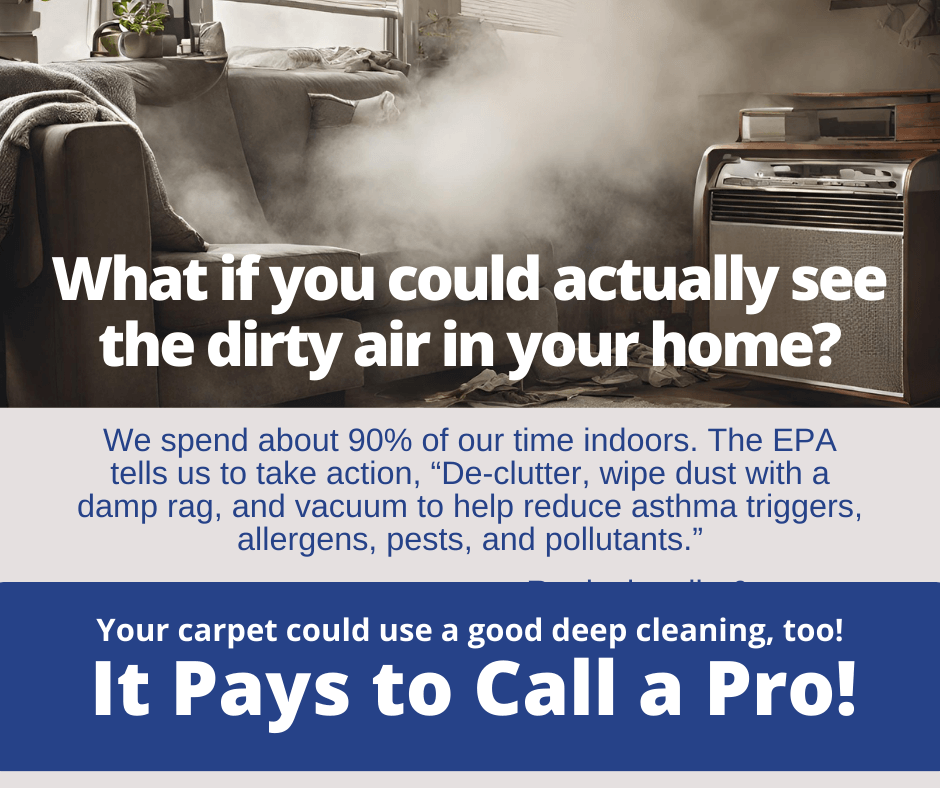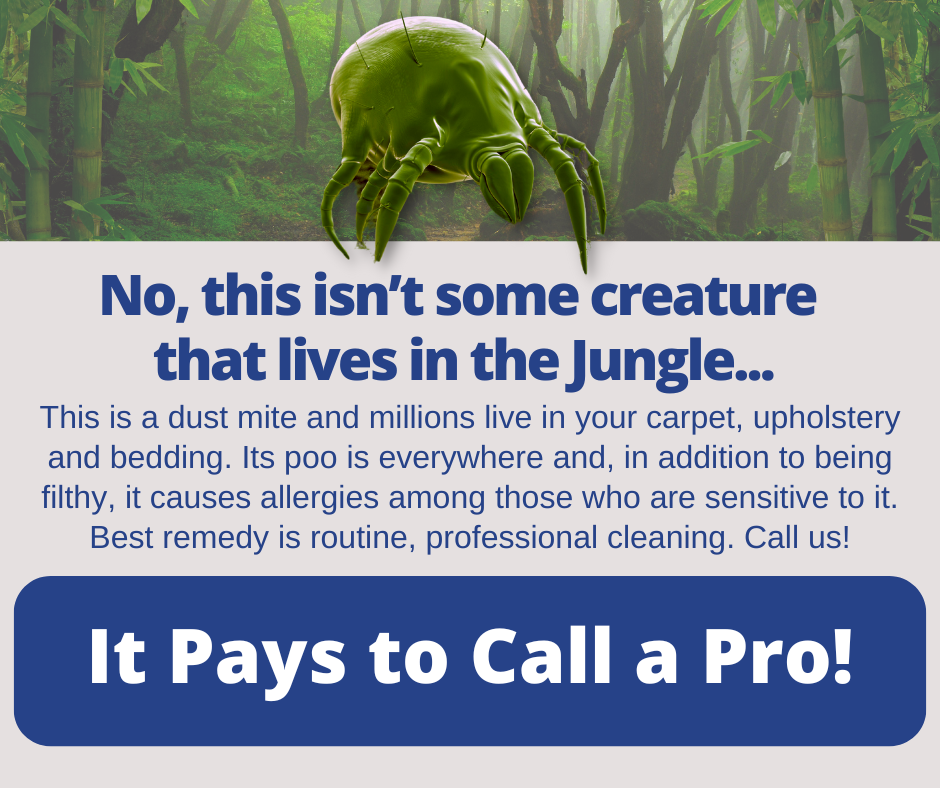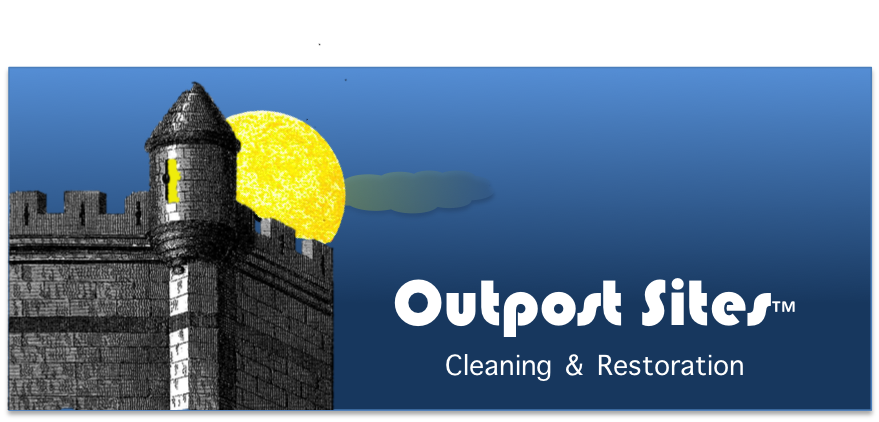|
Beware of Dirty Carpet!
A clean floor is a healthy floor. Yet many neglect cleaning one of the most common surfaces — carpeted floors. There are many reasons to beware of dirty carpet! While “clean” has primarily been directed at surfaces, what is hiding or that lies beneath, such as what can be in your carpet, is potentially harmful. If you have a significant amount of carpet in your home, it’s your biggest filter, and it collects a lot of dust, dander, and allergens. Look at your carpet from several angles. It’s a significant part of your home décor, it’s comfortable, it’s acoustical, among other great qualities. But it is also a reservoir for soil. Carpets may trap allergens like pollen, house dust mites, mold, animal dander, and microscopic parts of insects. These may cause allergic symptoms such as sneezing, red and itchy eyes, a runny nose, or breathing discomfort. This can become a serious health issue, especially for people with developing or advanced respiratory conditions. The situation is sometimes aggravated when improper vacuuming loosens particles into the air, which may cause instant allergic reactions. Dirty carpet carries harmful bacteria from a variety of sources. And this can be more threatening for children and pets because they are in contact with carpet for an extended period. Moreover, spills or pet urine, in particular, foster mold growth, expanding the potential health hazards through gut health and possibly acting as a repository for potential toxins. This can lead to microbial activity, causing carpet fiber damage, and can impact overall immunity in those you love. High microbial contamination in an environment like a dirty carpet causes the body's immune system to work more to fend off possible infections. Skin contact with dirty carpet can also cause irritations and infections like athlete's foot or worsen preexisting skin problems, such as eczema. It is essential to recognize potential issues and do the right thing: Keep your carpet clean. It’s just like any other surface. It would be unheard of to go a year without sweeping and mopping your hard floors. Imagine a bathroom floor going weeks or months… you get the picture. Why allow the carpet to go that long between cleanings? While you should beware of dirty carpet, you should embrace clean carpet. Do the right thing right now. Call your favorite cleaning company and book your cleaning appointment. While you are at it, book some furniture cleaning, too. After all, it pays to call a pro! Determined to Degrease
Have you seen yellow spots on the edges of your toaster, oven hood, or grills? You might wonder how it got there in the first place? Contrary to what you might think, these marks don't result from burning or heat—they're likely congealed cooking grease. But how do you tackle grease solidified on appliance surfaces, seemingly impervious to traditional cleaning methods? Here's how to banish stubborn yellow grease from your kitchen appliances. While a selection of degreasing products is available, you can also whip up effective solutions using items you already have at home. However, before using any product—store-bought or homemade—ensure compatibility with the surface of the appliance you are to clean. To avoid adverse reactions, test the solution on a small, inconspicuous area first. Mix half a cup of dish soap, three tablespoons of ammonia, and half a gallon of warm water to create your degreaser. Apply this mixture generously to the appliance, using an absorbent cloth (do not soak electronic appliances, obviously, and make sure whatever you work on is unplugged), allowing it to soak for a few minutes, depending on the amount of the soil. Afterward, carefully scrub the area with a pad or brush, avoiding abrasive or metal scrubbers to prevent surface scratches. Finally, rinse the area with soap and water, then dry with a paper towel. Another effective solution is WD-40. Apply it to the affected area and scrub the grease using a pad or brush. Then, wash the grease and WD-40 off with soap and warm water for a sparkling clean finish. Of course, the best defense against stubborn grease buildup is prevention. Make it a habit to wipe down your appliances regularly, especially after cooking sessions that generate a lot of grease. Simply using soap and warm water to wipe down kitchen surfaces can save you from facing future tough scrubbing battles. By incorporating these cleaning methods into your routine and staying proactive about maintenance, you can keep your kitchen appliances free from unsightly grease buildup and ensure they remain sparkling clean for years. Cleaning your home is often challenging to do and time-consuming for most. There’s an easier way, especially for special projects such as carpet and furniture cleaning, tile and grout cleaning, window washing, and more. Call your favorite cleaning company. After all, it pays to call a pro! How to Load a Dishwasher
You open the dishwasher, pull out a rack, and drop a dish into a slot. You keep doing that until there is no more room and push “start.” Is that the best way to load a dishwasher? Loading a dishwasher may seem like a simple task, but doing it right means sparkling clean dishes, and doing it wrong means scraping the crud your dishwasher missed and then just redoing a load. There are a few easy, expert tips you can implement to get the most from your faithful dishwasher. Pre-Rinse You don’t need to do this with a modern dishwasher. They are designed to remove food residues, and they do it well. While you should scrape large food particles from your dishes, put them in the dishwasher dirty. Give your dishwasher a chance. Dish Placement If you want hot water to spray easily on all surfaces, put large items on the bottom rack, as the directions should say. Face them inward toward the spray jets, but leave room for water to spray up and past those, reaching other dishes. Your dishwasher may have more than one spray arm, but it doesn’t hurt to leave gaps between dishes so more water flows throughout the interior. The Top The top rack, that is. All your smaller items go here, including cups and glasses. Place everything so dishes won’t tip over. If you have plastic dishes to wash and are concerned about the high heat and possible warping, those should go right at the top. If you are really concerned, you know what to do: Wash by hand. Utensils Your dishwasher has a special place for utensils, and you might think, “I’ll just put them all in there, and all good.” That might work, but some utensils, such as forks and spoons, can stick together, limiting cleaning. Put some upright, some upside down, and leave room for water circulation. The Right Stuff When choosing a detergent for your dishwasher, do your research. Look at the reviews. If your dishwasher has a prewash option, use it. It’s there for a reason. While you may do your dishes, you should leave some cleaning for the professionals, such as your carpet, furniture, and hard floors. Those are tougher than dishes. After all, it pays to call a pro! |
ALPHA CARPET & RUG CLEANING Mound, MN
Call 763-479-6800 Archives
June 2024
Cleaning OutPost Mound MN
|
Would you like to get your own OutPost Site? Cleaning and restoration firms who are MarketingZoo.com members get
|
CleaningOutpost.com Directory of Cleaning & Restoration Businesses is a service offered by MarketingZoo.com
Copyright 2015 Thinkshortcut Publishing, LLC
Copyright 2015 Thinkshortcut Publishing, LLC



 RSS Feed
RSS Feed
